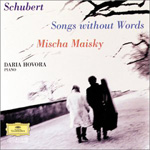 Franz Schubert A unique and beautiful take on Schubert's lieder, Songs Without Words features cellist Mischa Maisky performing 14 of Schubert's great vocal melodies in instrumental form, illuminating the great beauty of these songs. It is a strong performance, and the songs have been cherry-picked to offer a cross-section of Schubert's moods (from heavy to buoyant, hymn-like to classical) and a good representation of Schubert's great melodic legacy. I am not aware of any previous recording in which the lieder have been done instrumentally yet in their original form (accompanied by piano, with the instrumentalist playing the exact same part as the vocal line), and it's a great idea, very well executed. The end result is highly rewarding chamber music and will be of great interest to any admirer of Schubert as the essential songwriter. Maisky is an underrated cellist, never having made the "star" name for himself like a Yo-Yo Ma, but he is arguably a performer of greater depth than Ma (or your Ma, for that matter). I have not heard his whole output, but can recommend his recording of the complete Beethoven cello sonatas with Martha Argerich on piano (available in the DG Complete Beethoven Edition) as a great place to start. Or this one, for that matter, which might not feature the technical rigors that the Beethoven sonatas do, but which do feature perhaps a greater overall beauty. Maisky performs these songs with great care, clearly feeling them deeply, and as a non-vocalist performing these normally vocal works, he concentrates on the depth of emotion inherent in the pure melody of the songs. These are not challenging pieces, but are not simple to pull off convincingly without it merely sounding like karaoke klassical (I've got to trademark that name). Maisky is accompanied by pianist Daria Hovora, who I am not otherwise familiar with, but who proves a sensitive accompanist throughout. The disc opens with the "Arpeggione" sonata (also included on the highly-recommended recording of the "Trout" Quintet with Yo-Yo Ma and Emanuel Ax), and if it is not the definitive rendition of this sonata, it is still way up there (again, Maisky and Argerich is the preferred line-up on this one). It is a beautiful work, one that gets neglected next to some of Schubert's more immediately accessible chamber pieces (on the Ma disc, it follows a definitive "Trout" performance and as such does not stand out as much as it deserves to). It is definitely one of the "big" Schubert chamber works, and it's given a very committed performance here (marred only by some audible grunting from Maisky, which may actually be an added benefit for those listeners who like to fantasize about his big hairy face hovering over them in a sexual embrace that the law might call unnatural; myself, I reserve such fantasies only for Alfred Deller and Maria Joao Pires) (My goodness, I have stooped to sexual jokes about classical musicians! Surely that pleases no potential audience … ah well). The lieder follow the sonata (don't make me make a "follow the lieder" joke, whereupon I might be immediately hired for the writing staff on "Frasier," quite against my better judgment), and are very well selected with a balance of the familiar and comparatively unfamiliar. I am not sure whether greater enjoyment is derived from these performances if one is already familiar with the songs in their vocal forms (the Anne Sofie von Otter Schubert disc is recommended as a good starting point) or if this is in fact a good introduction to the songs themselves. In either case, they are beautiful songs, much deeper than Mozart yet just as memorable. High points on the CD include "Lied der Mignon," "Nacht und Traume," Am Meer," and the piece that closes the disc, "Du bist die Ruh," which is an extremely passionate performance that totally engages the listener. A lot of classical music is pretty, but I try to look for the music I really connect with, and this is right up there with Barber's "Adagio" and the theme from "Close Encounters" (points simultaneously awarded and deducted for increasingly abstract logic of intended humor). Some of Schubert's popular melodies also appear, including "Die Forelle," (the "Trout" song), "An Die Musik," and "Der Muller und der Bach." The whole program is worthwhile and full of reward, and while it is not necessarily essential to the ambiguous classical fan, it is a truly unique album and therefore, markedly more interesting than most new classical releases are. Maisky has endeavored to attempt something new with an old repertoire, and has succeeded. With the classical market flooded with new recordings of the same old stuff, it's nice to see a new twist, and especially when it gives a big shout-out to Schubert. (Look for my book of essays, Shout-Out to Schubert, due from Schubertiad Society Vanity Press sometime in the next quarter.)
Review by Wimpempy Tarlisle |